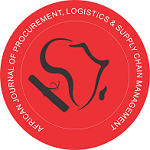William Akoto Oppong
School of finance & Financial Management | Business University of Costa Rica
Email: waoppong@gmail.com
Abstract
The study seeks to provide an insight into the procurement systems in Public Sector Administration in Ghana. This study seeks to contribute to knowledge and development of literature in the subject area, which is under investigation and serve also as a basis for further research to strengthen the knowledge base in this faculty. The findings will serve as a valuable reference to educationists and policy makers in trying to address some of the challenges of the procurement Act. It also seeks to provide a framework for ensuring effective procurement practices in both Public and private sector enterprises, so as to enhance good corporate governance through transparency and accountability. It also seeks to influence national and corporate procurement policies which would be of relevance to other public institutions and would also serve as a guide on what strategies to adopt in efficient procurement practices. Effective financial management and procurement systems have been one of the developmental challenges facing most developing countries in Sub-Saharan Africa, and Ghana is no exception. Financial management, especially public financial management is an attempt made by government to ensure that consistently, the budget is either in balanced or a surplus type. These are largely achieved through ensuring adequate receipts from taxes and non-tax sources, and reducing public expenditure levels. In Ghana, public procurement is a major activity of government that generates important financial resources and has been viewed as part of a wider reform agenda targeted at improving public financial management (Republic of Ghana, 2001). The primary concept of procurement is based on the premise that advanced planning, scheduling, and group buying would result in cost savings, more efficient organizational operation, and therefore improve transparency and accountability. A procurement systems main objective is to manage this process, providing turnaround time for invoices, tracking of total spending by commodity type, as well as financial commitments and cash flow management. The complete implementation of a procurement system usually results in significant changes to the existing business process, as the system would require certain internal controls and procedures to be in place.
Keywords: Public Financial Administration, Economic management, Procurement Acts, Procurement System, Development Economics

